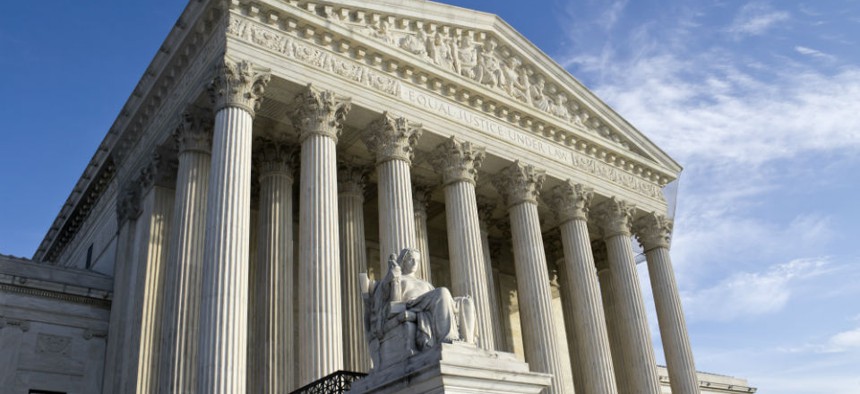
The Supreme Court has been asked to intervene in the office’s keeping wraps on opinions in such serious subjects as domestic surveillance and torture of suspected terrorists. M DOGAN / Shutterstock.com
Obama Administration Took Unusual Step in Releasing Justice Memo on Immigration
Office of Legal Counsel’s opinions are often kept behind closed doors.
In the run-up to President Obama’s Nov. 20 announcement of his executive order on immigration, conservative voices such as The Wall Street Journal’s editorial page demanded that he test his policy’s rigor by showing he had consulted the Justice Department’s Office of Legal Counsel.
That office—headed by Principal Deputy Assistant Attorney General Karl Thompson—provides advice on constitutional questions for the entire executive branch and vets all the president’s executive orders. It has traditionally kept many of its written opinions secret.
So secret, in fact, that the Washington-based Electronic Frontier Foundation in June asked the Supreme Court to intervene in the office’s keeping wraps on opinions in such serious subjects as domestic surveillance and torture of suspected terrorists during the George W. Bush administration.
On Nov. 20, the Obama administration posted the Office of Legal Counsel’s Nov. 19 legal opinion backing the president’s draft order on two of three counts. It concluded that the Homeland Security Department’s “proposed prioritization policy and its proposed deferred action program for parents of U.S. citizens and lawful permanent residents would be permissible exercises of DHS’ discretion to enforce the immigration laws. We further conclude that, as it has been described to us, the proposed deferred action program for parents of [Deferred Action for Childhood Arrivals] recipients would not be a permissible exercise of enforcement discretion.”
Thompson, who was appointed in March, was previously counselor to the attorney general and served for nearly four years in the Office of Legal Counsel. He worked in private practice at the Washington, D.C. office of O’Melveny & Myers LLP, and previously clerked for Judge David Tatel of the U.S. Court of Appeals for the D.C. Circuit, and Supreme Court Justice Ruth Bader Ginsburg.
On Friday, the Wall Street Journal editorialists blasted Thompson’s handiwork as is “an abuse of power that fails as a policy reform.” But, the opinion-molders continued, “At least he finally rolled out a memo from the experts on presidential power in the Justice Department Office of Legal Counsel, but it’s fair to wonder how much time he gave them. The OLC made its justification public about an hour before the [president’s televised] speech.”
Though scads of political commentators and Republican lawmakers criticized the order as an executive overreach that poisons relations with Congress, legal critiques of the Office of Legal Counsel’s document were relatively few. One was posted online Nov. 22 by South Texas College of Law Assistant Professor Josh Blackman.
“While the OLC’s theory seems consistent with precedent — and OLC went out of its way to do so — it remains to be seen whether the policy operates in accordance with this theory,” Blackman wrote of Obama’s invocation of limited prosecutorial discretion. “Instead of simply rearranging priorities for the purpose of conserving resources with regard to one class [of immigrants], the policy creates a framework where brand new costs are incurred due to setting the priorities. And it is this second group — a materially larger group — that creates constitutional difficulties. The weakness of the latter aspect makes the justification for the former less plausible.”
(Image via M DOGAN / Shutterstock.com)
NEXT STORY: The History of Cabinet Shakeups, Charted







